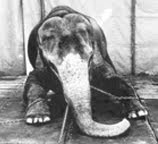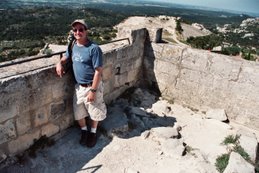 Well,I'm on the bus again now to my final New Zealand destination, Christchurch, half-way down the coast of the South Island. According to the guidebooks, it should be the prettiest of the cities I've visited so far. The buses ("coaches" here) are really the way to go: you can relax, enjoy the scenery, meet new people, and maybe get a bit of reading or writing done.
Well,I'm on the bus again now to my final New Zealand destination, Christchurch, half-way down the coast of the South Island. According to the guidebooks, it should be the prettiest of the cities I've visited so far. The buses ("coaches" here) are really the way to go: you can relax, enjoy the scenery, meet new people, and maybe get a bit of reading or writing done.  And the coaches are very nice, with large, comfy seats (better than most airplanes), usually with lots of empty ones, and even bathrooms in the back. These ain't Metrobuses!
And the coaches are very nice, with large, comfy seats (better than most airplanes), usually with lots of empty ones, and even bathrooms in the back. These ain't Metrobuses!The countryside along the coast reminds me of a mix of Oregon coastline and Texas hill country. It's quite pretty and green, with gravel streams coursing lazily to the sea. I've spotted some "Middle-Earth" type areas that look like the Lord of the Rings may have been filmed there. (There was a tour in Wellington to go see "The Shire", but I didn't have time.)
Anyway, I had a great time at Arapawa (pronounced Ara-PA-wa) Island
 and Betty Rowe's animal sanctuary. It was very isolated and a bit rugged, but that made it a nice break from the cities I'd been touring up til then. It's just a little farmstead with twenty or so Arapawa goats, a pair of sheep, two young feral island pigs that came around to scrounge, and assorted geese, cats, and a Weka or two, a Kiwi-like bird that humans haven't managed to wipe out yet.
and Betty Rowe's animal sanctuary. It was very isolated and a bit rugged, but that made it a nice break from the cities I'd been touring up til then. It's just a little farmstead with twenty or so Arapawa goats, a pair of sheep, two young feral island pigs that came around to scrounge, and assorted geese, cats, and a Weka or two, a Kiwi-like bird that humans haven't managed to wipe out yet.Betty started her sanctuary in the '70's, soon after her and her late husb
 and Walt moved there to manage sheep on the island. They soon discovered the beautiful wild varieties of goats, sheep and pigs that all have striking coats ranging from black & white to calico or torti-like colors, and sweet, shy personalities. After asking around they found that even the locals didn't know where they came from. Painstaking research indicated that
and Walt moved there to manage sheep on the island. They soon discovered the beautiful wild varieties of goats, sheep and pigs that all have striking coats ranging from black & white to calico or torti-like colors, and sweet, shy personalities. After asking around they found that even the locals didn't know where they came from. Painstaking research indicated that  they may in fact be descendants of old English breeds actually left there by Captain Cook on his expeditions in the 1700's. And even thought DNA tests proved that they are distinct, rare breeds (the English link has yet to be proven definitively), the New Zealand government, astounding as it may seem, wants only to exterminate them, as they aren't true native wildlife.
they may in fact be descendants of old English breeds actually left there by Captain Cook on his expeditions in the 1700's. And even thought DNA tests proved that they are distinct, rare breeds (the English link has yet to be proven definitively), the New Zealand government, astounding as it may seem, wants only to exterminate them, as they aren't true native wildlife.So Betty and her friends have been fighting the Department of Conservation for decades, and despite some government slaughters that have decimated the goat populations, have managed to preserve some on their 300-acre
 sanctuary, and export some to other rare-goat breeders in the U.S. and Britain. She is slowly gathering support from the media and people worldwide, so hopefully soon the D.O.C. will put a stop to the killing.
sanctuary, and export some to other rare-goat breeders in the U.S. and Britain. She is slowly gathering support from the media and people worldwide, so hopefully soon the D.O.C. will put a stop to the killing.But even then the danger won't be over yet. There are less than 350 of the goats worldwide, hardly a plentiful breeding gene pool. And Betty told me about just a couple of years ago how she watched as a boat passed slowly by in front of the sanctuary (and its large "Animal Sanctuary" sign), the
 n as soon as it was around the bend, shots started ringing out. The idiots ("hoons", as they are called here) shot twenty of the goats with high-powered rifles from the boat, just for fun. And these brave "hunters" even had children with them. When one of Betty's sons raced furiously after them, they fled for Picton, but were fortunately soon caught. But due to New Zealand's weak animal welfare laws, they were only fined NZ$500 (about $400) and the sho0ter's gun license was taken away. Keep in mind these were Betty's own goats, many of whom she had hand-reared since they were babies, and each had names and distinct personalities. The saddest part is, if they had only stopped at the sanctuary, Betty would have gladly welcomed them in for tea (as she does all visitors), and the children could have met and petted the friendly goats. But instead, like children
n as soon as it was around the bend, shots started ringing out. The idiots ("hoons", as they are called here) shot twenty of the goats with high-powered rifles from the boat, just for fun. And these brave "hunters" even had children with them. When one of Betty's sons raced furiously after them, they fled for Picton, but were fortunately soon caught. But due to New Zealand's weak animal welfare laws, they were only fined NZ$500 (about $400) and the sho0ter's gun license was taken away. Keep in mind these were Betty's own goats, many of whom she had hand-reared since they were babies, and each had names and distinct personalities. The saddest part is, if they had only stopped at the sanctuary, Betty would have gladly welcomed them in for tea (as she does all visitors), and the children could have met and petted the friendly goats. But instead, like children  themselves, all these morons could think to do was shoot them. I wonder what kind of lesson they thought this was teaching their kids?
themselves, all these morons could think to do was shoot them. I wonder what kind of lesson they thought this was teaching their kids?This kind of callous disregard for other animals is unfortunately prevalent in rural New Zealand. One common method of "hunting" on the islands is for people to let dogs loose from their boats to run down the wild pigs and other animals, and attack them until, at last, if the hunters even bother, they come and shoot the prey. This kind of cowardly ignorance left a pig screaming in the woods near Betty's house, where her husband found it with three of its legs chewed off (whereupon he immediately shot it). The "hunters" hadn't even bothered to find it. And guess what? There's NO
 laws against this at all. It's perfectly legal here. And apparently the dogs trained to do it are half-starved, then thrown bits of pig flesh to fight over, just to get them used to that kind of thing. Wonderful pastime, ain't it?
laws against this at all. It's perfectly legal here. And apparently the dogs trained to do it are half-starved, then thrown bits of pig flesh to fight over, just to get them used to that kind of thing. Wonderful pastime, ain't it?So the battle against shortsightedness and ignorance continues, meanwhile Betty gets help from many volunteers and people who write or email from around the world. While I was there she received a letter and a $50 donation from someone who had read her story on the internet. But those a few and far between, and for now she mostly relies on her sons and other friends to help keep her little farm going. [If you'd like to read more about the sanctuary and see some pictures of the striking goats, click on http://www.rarebreeds.co.nz/rowe.html
I had offered to volunteer there for a few days at the Sanctuary with Betty, who invited me to stay as long as I wanted. Her son Mitch met me in the nearby town of Picton and with his pretty wife Deb, bought me out to the island, where they have their own nearby weekend home. Betty met me on the dock with a hug, and we carried in the groceries I had brought. We hardly needed them--she served me delicious vegetarian dishes for my whole stay. There wasn't a huge amount of work for me to do-- I re-hung a shed door, pruned a large branch off a tree, did a bit of cleaning and general handyman stuff, but mostly I just enjoyed feeding and getting to know the animals. One afternoon I went for a hike up into the rugged mountain behind the farm and along the beach, and in the evenings we sat on the porch with a stupendous view of the bay, and had long talks about life in New Zealand. It was, so far, the highlight of my trip... I even got to
 name a couple of the animals: there are two magnificent rams, but they were just called "Rambo I and II"; I named the second one Ramses. And a handsome male goat wandered in from the hills and settled in, purely voluntarily, with the herd at the sanctuary (perhaps it's lonely in the wild); he is a beautiful, healthy-looking specimen, so we came up with--what else?-- "Hercules". (Note: when he arrived, the resident couple of geese made sure he knew his place, by pecking at him for a bit! He took it calmly and now hangs
name a couple of the animals: there are two magnificent rams, but they were just called "Rambo I and II"; I named the second one Ramses. And a handsome male goat wandered in from the hills and settled in, purely voluntarily, with the herd at the sanctuary (perhaps it's lonely in the wild); he is a beautiful, healthy-looking specimen, so we came up with--what else?-- "Hercules". (Note: when he arrived, the resident couple of geese made sure he knew his place, by pecking at him for a bit! He took it calmly and now hangs  around with the other males, an accepted member of the family.)
around with the other males, an accepted member of the family.)One final note about the island for you astronomy buffs I had what was quite probably the best, clearest night of my life for stargazing while there. The island is practically uninhabited, it's in the middle of the Pacific, and there was no moon-- we're talking clear, dark skies. So after dinner, I walked up a little rise to the gueast house to go to bed, and I remembered to look up. Well, there should have been an orchestra playing a crashing symphony, or at least some of that stargazing music from Cosmos, because I was awestruck. Stretching across the whole sky was the Milky Way, big and bright and you could see why it was called the 'backbone of the night" by the ancients. I could almost hear Carl Sagan saying "billions and billions of stars". The next thing I saw was the constellation Orion-- but oddly, he was upside-down! --but even then, he was so bright, his sword stood out better than I'd ever seen it. Then I immediately hunted for the Southern Cross, which I spotted quite easily, big and bold, hanging there in the sky like a celebrity I'd read about all my life but never seen until now... then I noticed Leo, which I'd also never seen except in observatories. always being too low on the horizon.
And finally, I noticed a fuzzy patch of sky that looked at first like a comet I'd seen once, but much bigger. Then it sunk in to my head that this must be one of the fabled Magellanic Couds, the sister galaxies to the Milky way, also visible only in the southern hemisphere. I had forgotten all about them until then. I must have stood there for a half hour, struck by the majesty and permanence of those stars, and felt, for a moment, a kinship to the universe that I've never felt before. It's hard to explain, and I'm sure it sounds corny now, but I stretched out my arms and said out loud, "I'm part of all this", at the same time knowing that my life is fleeting and insignificant against the backdrop of Eternity.
Sorry, but I guess the splendor of it all brought out the poet in me.
Next: Christchurch: City of Gardens.





No comments:
Post a Comment